|
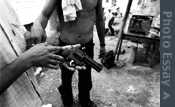 Paris
Comuna, Medellín June 15, 2001 Paris
Comuna, Medellín June 15, 2001
"We
still have more murders a year than in all the rest
of Colombia. Why don’t you reporters write about
what’s happening in Medellín anymore?"
I
have come to Medellín to document efforts toward
peace and reconciliation, with a particular focus on
programs that prevent community and/or youth violence.
And so on my first visit a few months back, I was surprised
to find that that was the question nearly everyone asked
of me--prison directors, academics, prosecutors, community
activists, ordinary people in the famously violent barrios
known as comunas. Why, they demanded to know, had Medellín,
once the object of so much foreign media attention,
been all but forgotten? The longer I stay here the more
pertinent their question seems.
For the last six years, the local combos (or gangs)
in the northwesternmost section of the city have managed
to hammer out and respect non-aggression pacts with
one another. This would never have been possible without
Medellín’s Process of Reconciliation (formerly
known as Peace and Living in Harmony). Los Muchachos,
the band that controls Paris, has even submitted a business
plan to the Medellín Business Bureau to transform
the tradition of "protection money" (called
vacunas) on bus routes. Instead of "extorting"
money, they propose forming a cooperative that will
charge fair rates for the amenities the community provides
to the bus companies, which include safe parking places,
and the washing and servicing of vehicles.
The process in Paris interests me for several reasons.
For 35 years of its history, Paris was totally abandoned
by state institutions, including the police and military.
Lacking public funds, the community's own efforts provided
the infrastructure for water, light, roads, education,
and health institutions.
For a brief spell during the Escobar years, "Pablito"
became a benefactor, building a soccer field in the
community. A few of the elder members of Los Muchachos
worked as hired contract killers for the drug lord.
But the relation lasted only a year before the community's
self-sufficient spirit led to a war for independence
from the cartel. As part of the peace deal with Escobar,
Los Muchachos were allowed to develop a fringe of illegal
activities that held no interest for the cartel. In
addition to sustaining the families of Los Muchachos,
these activities contributed significantly to the economy
of the wider community.
A decade later, changing economic fortunes and other
pressures have caused Los Muchachos to consider a different
development strategy. Their business plan and active
participation in a larger community-wide peace initiative
involving the local schools, the Catholic Archdiocese,
and the local health clinic suggest that the group is
serious about change, receptive to the needs and rights
of other community institutions, and open to non-violent
negotiation.
|
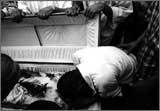 |
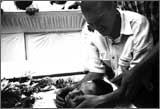 |
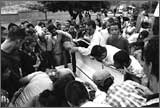 |
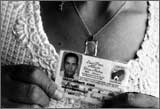
Funeral
for Einer Metaute, murdered in an attack by AUC
on a cafe at the bus terminal on June 12th which
left 4 dead. |
|


